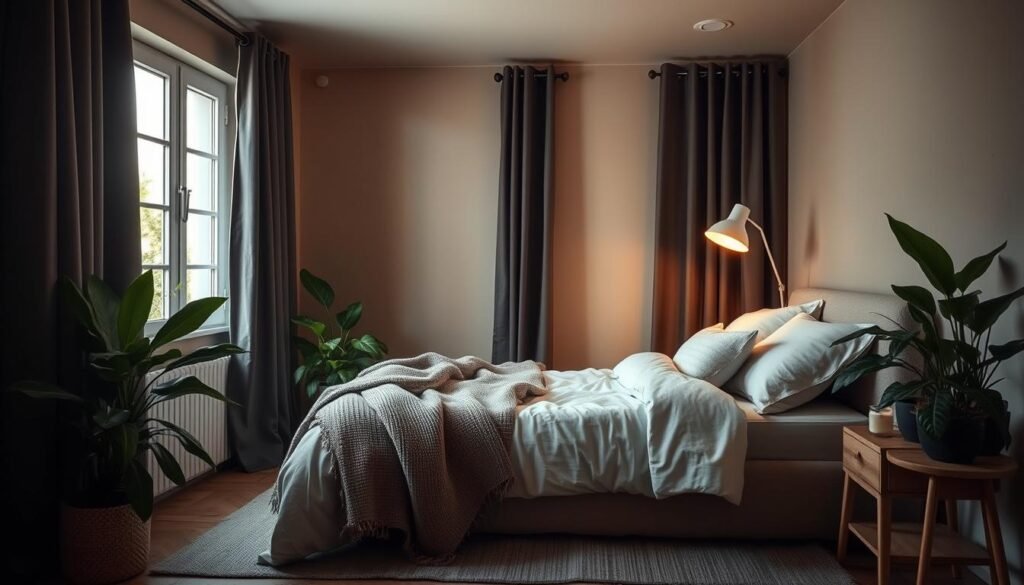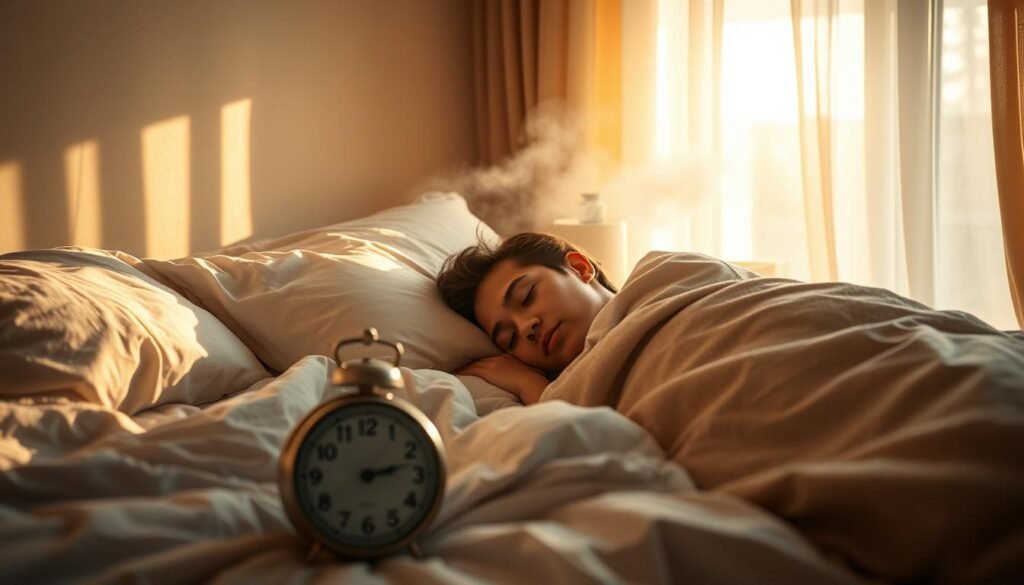About 42% of young people find it hard to wake up in the morning. But it’s not just them. Many adults also deal with waking up too early and not being able to fall back asleep. It’s important to understand sleep issues and the negative impact of broken sleep on health and day-to-day life.
Insomnia lowers daily energy and sleep quality. This can lead to mental and physical health problems. But, there’s hope with treatment for insomnia and lifestyle changes. Making a regular sleep schedule and relaxing before bed can help beat early morning insomnia.
Key Takeaways
- Early morning awakening insomnia affects sleep quality and daily functioning.
- Adopting healthy sleep habits can help mitigate insomnia.
- Limiting caffeine and alcohol intake contributes to better sleep quality.
- A relaxing bedtime routine and sleep-friendly environment foster rejuvenating sleep.
- Understanding the role of stress and psychological factors is crucial in treating insomnia.
The Nature of Insomnia and Sleep Disorders
Insomnia includes many sleep problems, from trouble falling asleep to staying asleep. It is a part of sleep disorders which can greatly affect a person’s mind and body health. Studies show 30% to 43% of adults face insomnia symptoms at some point. Between 5% to 15% are diagnosed with insomnia disorder. For many, it lasts over a year.
Acute insomnia lasts less than three months and is different from long-term insomnia. Long-term or chronic insomnia happens three nights a week for over three months. Insomnia has several forms, such as problems starting sleep, keeping asleep, or waking up too early. Each type has its own challenges and reasons.
Learning about insomnia reveals its link to health issues like anxiety and depression. Recent studies are looking into how genes and environment play a role in insomnia.
Insomnia’s impact goes beyond just sleep trouble. It affects daily life and happiness, harming mental and physical health. Researchers and doctors are working to get a better understanding of insomnia. This is to improve diagnosis and treatments for people.
| Type of Insomnia | Description | Implications for Health |
|---|---|---|
| Short-term Insomnia | Lasts less than three months | Generally less severe, but can trigger anxiety |
| Chronic Insomnia | Occurs three or more nights per week for three months or longer | Increased risk of mental health issues |
| Sleep Onset Insomnia | Difficulty falling asleep at night | May lead to daytime fatigue |
| Sleep Maintenance Insomnia | Inability to stay asleep throughout the night | Can affect cognitive performance |
| Early Morning Awakening Insomnia | Waking up too early | May contribute to distress and sadness |
Understanding Early Morning Awakening Insomnia
Early morning awakening insomnia is a type of sleep issue. It makes people wake up too early and unable to sleep again. It lowers the quality of sleep and makes you feel tired and unrefreshed in the morning. It’s important to know what it is and what causes it to manage it well.
Defining Early Morning Awakening Insomnia
Having trouble staying asleep, especially in the early hours, is how we define this insomnia. It’s frustrating to wake up hours before you want to, feeling too awake to sleep again. This issue is a part of sleep maintenance insomnia. It’s more common in older adults, leading to more sleep problems.
Connection to Sleep Disorders
This type of insomnia is closely linked to other sleep disorders. Sleep apnea and advanced sleep phase syndrome can make it worse. Sleep apnea disrupts sleep, especially in REM stages, causing early wake-ups. Age changes how fast we fall asleep and how well we sleep. Fixing these underlying issues is key to better sleep.
| Insomnia Type | Common Age Group | Associated Disorders |
|---|---|---|
| Sleep-Onset Insomnia | Younger Adults | Occasional Anxiety |
| Sleep Maintenance Insomnia | Older Adults | Depression, Sleep Apnea |
| Early Morning Awakening Insomnia | Older Adults | Psychiatric Disorders |
Common Causes of Sleep Disturbances
Understanding what causes sleep problems is key to fixing them. Both mental and physical health play big roles here. These issues can lead to insomnia and other sleep troubles.
Identifying Psychological Factors
Mental health is often behind sleep problems. Feeling very anxious or depressed can mess with how well you sleep. People with these issues might find it hard to fall or stay asleep.
This leads to waking up too early. Also, stress can cause sleeplessness that turns into long-term insomnia if it’s not dealt with.
Physical Health Implications
Your physical health affects your sleep too. Conditions like ongoing pain, breathing problems, and diabetes can disrupt your sleep. Problems like these can make you feel more tired and groggy when you wake up.
How Sleep Hygiene Affects Sleep Quality
Understanding how sleep hygiene affects your sleep is key. Good sleep hygiene sets up a routine for better sleep. Bad habits lead to trouble sleeping and feeling tired during the day.
Establishing a Consistent Sleep Schedule
Having a steady sleep pattern is important. It helps your body’s clock stay on track. Try setting a wake-up time and avoid long naps to improve your sleep quality. This helps you feel better overall.
Creating a Sleep-Friendly Environment
Making your bedroom sleep-friendly is vital. The right room temperature and a good mattress help a lot. Use comfy bedding and block out light for better sleep. Adding calming scents and a quiet setting helps sleep come easier.

Identifying Insomnia Causes
Understanding the reasons behind insomnia is key for improving sleep. Both outside factors and internal worries play a big part in sleep issues. Diving into these causes shows how they lead to ongoing insomnia.
External Factors Contributing to Insomnia
Many outside factors can impact how well you sleep and may cause insomnia. Things like noise and light can disturb sleep. Bad habits, such as too much screen time and poor eating, also affect sleep. Common causes of insomnia include:
- High caffeine intake, especially late in the day.
- Irregular sleep schedules that confuse your body clock.
- Too much technology use before bed, which affects melatonin levels.
- An uncomfortable bedroom, maybe too warm or too cold.
The Role of Internal Stressors
Internal stressors greatly impact how well you sleep. Feelings like anxiety and stress lead to trouble sleeping. These stressors cause thoughts to race, making it hard to wind down. Knowing about these emotional issues helps in finding ways to deal with them, such as:
- Using mindfulness and meditation to quiet the mind.
- Creating a calming bedtime routine to tell your body it’s time for sleep.
- Writing in a sleep diary to spot what causes your insomnia.
Acknowledging both external and internal factors helps in tackling insomnia. By choosing healthier habits, one can lessen these causes, improving sleep quality.
Effective Insomnia Treatment Options
Many treatments are available for insomnia, focusing on behavior and meds. Behavioral therapy, especially cognitive-behavioral therapy (CBT), is great for treating insomnia. It aims to change bad sleep habits and thoughts. This method helps people sleep better.
Behavioral Therapy Approaches
Cognitive Behavioral Therapy for Insomnia (CBT-I) is often suggested as the initial treatment for lasting insomnia. It uses different techniques to address insomnia’s core issues, not just the symptoms. This therapy includes:
- Sleep education
- Sleep restriction
- Stimulus control
- Sleep hygiene
- Cognitive therapy
- Relaxation exercises
CBT usually involves 6 to 8 sessions and can vastly improve sleep. Both behavioral sleep medicine experts and primary care providers can help, although finding certified specialists might be hard.
Medication Considerations
During stressful times, some people might need medication for insomnia. Common drugs include benzodiazepines and nonbenzodiazepines, which doctors must prescribe. These meds may lead to dependence and withdrawal symptoms. Melatonin agonists and orexin receptor antagonists are used for different sleep problems.
Choosing the right sleep medication requires medical advice due to possible severe side effects. Talking regularly with healthcare providers is key to safe and effective treatment. For more information on insomnia treatments, please visit this source.
Tips for Improving Sleep Quality
Improving sleep quality begins with simple steps in your daily life. Focusing on healthy eating and staying active is key. Both have a big impact on sleeping better.
Importance of Healthy Eating Habits
What you eat affects how well you sleep. Choose foods rich in vitamins and minerals to help you relax and sleep better. A balanced diet includes:
- Fruits and vegetables
- Whole grains
- Lean proteins
Eating these can lay the groundwork for improved sleep. Avoid heavy meals, caffeine, and alcohol before bed to prevent sleep problems. People who eat lighter breakfasts feel more alert all day. Eating earlier can help with digestion and affect your sleep cycle, helping you sleep and wake up earlier.
Physical Activity and Its Impact on Sleep
Regular exercise is a natural way to sleep better. It’s especially useful for people with insomnia. It’s best not to exercise too close to bedtime as it can cause sleep issues. Morning exercise helps you sleep better and feel less tired during the day. Getting sunlight during morning workouts can also improve your sleep schedule.
Doing different exercises like:
- Cardiovascular exercises
- Strength training
- Yoga or stretching
can boost your health and lessen sleep problems. Studies show that staying active improves the length and quality of your sleep. It helps you wake up feeling more refreshed.
| Food Type | Impact on Sleep | Recommendations |
|---|---|---|
| Fruits | Rich in vitamins and antioxidants | Include berries and cherries for melatonin |
| Whole Grains | Helps with serotonin production | Opt for oats and brown rice |
| Lean Proteins | Contains amino acids that promote sleep | Incorporate fish, chicken, and legumes |
| Caffeine | Disrupts sleep when consumed late | Avoid within 6 hours of bedtime |
| Heavy Meals | Can cause discomfort and disrupt sleep | Eat lighter dinners to aid digestion |
Practical Strategies to Mitigate Sleep Disturbances
Many people have trouble with insomnia. They find it hard to fall asleep or stay asleep. Mindfulness and relaxation techniques can greatly improve sleep quality.
Using these methods helps soothe the mind and body. This leads to a more restful night of sleep.
Mindfulness and Relaxation Techniques
Mindfulness practices like autogenic training, the Military Method, and 4-7-8 Breathing reduce stress. Autogenic training uses phrases that create a sense of warmth and calm. The Military Method focuses on relaxing muscles and picturing calming scenes.
The 4-7-8 Breathing technique is great for easing anxiety. It does so through a controlled breathing pattern.
Limiting Screen Time Before Bed
Blue light from screens can hurt sleep by lowering melatonin levels. It’s wise to avoid screens an hour before bed. To sleep better, make your bedroom sleep-friendly and stick to a regular sleep time.

| Technique | Benefits | Implementation |
|---|---|---|
| Autogenic Training | Induces relaxation and reduces anxiety | Recite calming phrases focusing on body sensations |
| Military Method | Facilitates quick relaxation | Relax body systematically while imagining peaceful scenes |
| 4-7-8 Breathing | Promotes calmness and reduces stress | Inhale for 4, hold for 7, exhale for 8 (repeat) |
| Screen Time Limitation | Improves sleep onset and quality | Avoid screens 1 hour before bed |
The Importance of Managing Stress Levels
Stress has a big impact on how well you sleep. It creates a cycle between stress and poor sleep. Understanding this link shows why it’s crucial to manage stress for a good night’s rest. When stress levels go up, it messes with the body’s sleep cycle. It cuts down on deep, healing sleep time. People dealing with ongoing stress often face insomnia. This issue can get worse due to work problems, bad relationships, or serious health worries.
Recognizing the Link Between Stress and Sleep
Learning to handle stress is key to sleeping better. The tie between controlling stress and avoiding sleep troubles is clear. If stress keeps up, it can lead to big health problems like high blood pressure, breathing difficulties, and stomach issues. These health issues can then ruin your sleep. This starts a sad loop of not sleeping well and feeling worse mentally. Tackling stress at its root not only helps with sleep troubles but also boosts your overall health.
The following table illustrates the effects of stress on sleep and related health outcomes:
| Stress Impact | Consequences on Sleep | Related Health Issues |
|---|---|---|
| Chronic stress | Disrupted REM sleep | Hypertension, heart disease |
| Repeated anxiety | Reduced deep sleep time | Increased inflammation |
| Stress-induced muscle tension | Difficulty falling asleep | Migraine headaches, back pain |
| High stress levels | Frequent awakenings | Respiratory problems, gastrointestinal disorders |
Using stress-reduction strategies really helps improve sleep. Techniques like mindfulness, exercising, and therapy can make a big difference. By actively reducing stress, you can look forward to better sleep. Working on stress relief not only aids in beating insomnia but also makes life richer.
Experiencing Sleep Inertia
Sleep inertia is that groggy feeling you get when moving from sleep to being fully awake. It often makes you feel sluggish and affects how well you perform tasks. This state can last from 15 to 60 minutes after you wake up. For some, it might even linger for hours. Shift workers often face this challenge. About 16% of U.S. employees work shifts and may find their alertness levels drop.
What is Sleep Inertia?
Sleep inertia comes from waking up suddenly from deep sleep. It also relates to certain chemicals, like adenosine, building up in the brain. These factors make it hard to wake up and cause confusion. People with mood issues might have a harder time in the mornings. Knowing these factors helps find ways to ease waking up.
How to Reduce Its Effects
To lessen sleep inertia, try these steps:
- Set consistent wake-up times to help your body know when to wake up.
- Utilize gentle alarm sounds to wake up more smoothly.
- Engage in morning light exposure to tell your brain it’s time to wake up.
- Adjust bedroom temperature for a better sleep setting.
- Limit caffeine and alcohol intake for deeper, more restful sleep.
- Keep a sleep journal to spot trends and what causes sleep inertia for you.
- Try short naps to avoid deep sleep but still refresh.
Using these strategies can help cut down on sleep inertia. It also helps you stay more alert all day. It’s important to understand how your sleep affects your wakefulness. This awareness can lead to better overall health.

Establishing a Morning Wake-Up Routine
Creating a morning routine helps boost daily energy and productivity. Gradually changing wake time can sync sleep patterns with our body’s clock. This makes waking up easier and improves alertness all day.
Gradually Adjusting Your Wake-Up Time
Small changes to your wake-up time are best for a healthier morning. It lets our body’s clock adjust without stress. Keeping the same wake-up time every day boosts our energy levels.
- Start by waking up 15 minutes earlier than usual and gradually increase it.
- Establish a fixed wake time, even on weekends, to enhance sleep hygiene.
- Allow one to two weeks for the body to adapt before making further changes.
Utilizing Natural Light Exposure
Natural light is key for our internal clock and feeling awake in the morning. Getting 15 to 30 minutes of light when we wake up helps a lot. It makes us more alert and improves our sleep.
- Open curtains to let in sunlight or take a short walk outside in the morning.
- Consider using light therapy lamps if morning sunlight is limited.
- Incorporate breakfast as part of your morning routine to boost energy levels.
Creating a good morning routine with gentle wake-up times and sunlight makes us feel more energetic. It also lifts our mood and makes mornings pleasant. These steps support our overall well-being.
Conclusion
Dealing with early morning insomnia needs several steps focusing on good sleep and stress management. Knowing when to get help is crucial too. By understanding sleep disorders and their causes, people can find ways to fight insomnia.
Following expert advice helps a lot. This includes sticking to a regular sleep time, making your sleeping area comfortable, and using relaxation techniques. Healthy habits, like eating well and staying active, also play a big role in sleeping better.
In the end, knowing about the issue and taking action is key to overcoming sleep problems. By doing this, one can greatly improve their well-being. It leads to a better sleep pattern and a happier, healthier life.